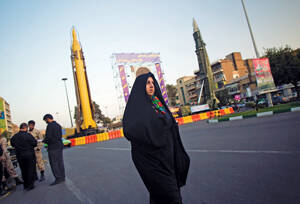A pre-emptive military response aimed at thwarting Iranian nuclear ambitions “should be off the table,” said Gerald Powers, director of Catholic peacebuilding studies at the Joan B. Kroc Institute for International Peace Studies at the University of Notre Dame. Powers was responding to a report released on Nov. 8 by the International Atomic Energy Agency, the U.N. nuclear watchdog, that expressed “serious concerns regarding possible military dimensions to Iran’s nuclear program.” According to the report, “Iran has carried out activities relevant to the development of a nuclear explosive device.” The report concludes that “prior to the end of 2003, these activities took place under a structured program, and that some activities may still be ongoing.”
Powers argues, however, that even if Iran has been pursuing nuclear capability, a military response meant to set that effort back would lead only to more instability in an already troubled region of the world. He said the “muted” U.S. response so far to the revelations contained in the new I.A.E.A. report was appropriate. “We have to be clear that the use of military force against Iran should be off the table—period,” said Powers, who called that response neither morally nor legally justifiable.
“The prospect of Iran developing nuclear weapons is deeply troubling,” said Bishop Howard J. Hubbard of Albany, N.Y., chairman of the U.S. bishops’ Office of International Justice and Peace. “Iran has threatened its neighbors, especially Israel, and contributes to the widespread instability of the region.” But, Bishop Hubbard added, “recent news accounts speculating on the possible use of force against Iran are also troubling.”
“From a moral perspective,” he said, “in the absence of an immediate threat to attack others, military action against Iran would constitute an act of preventive war, which raises serious moral questions.”
Powers was most concerned about the international “norm” that a pre-emptive strike aimed at nonproliferation would establish. “To say that counter-proliferation efforts should include the use of preventive military force would represent a major departure from moral norms on the use of force.” Where is the just cause? Powers asked, when an attack is planned based on a suspicion that a nation is developing nuclear capability, and what kind of precedent would that create? Other nations, he argued, could apply the same logic to their regional adversaries—Iran against Israel, South Korea versus North Korea, for example. “That’s a formula for enormous instability,” said Powers.
According to Powers, both the United States and Israel have credibility problems related to nonproliferation. The United States has already acquiesced to the development of nuclear weapons in India and has never disavowed a first-strike nuclear option even to a nonnuclear threat. Israel is not a signatory to the Nuclear Nonproliferation Treaty of 1970 and is believed to maintain a significant nuclear stockpile itself.
Iran, Powers said, is a “tough regime, but the tough regimes are usually the ones you have to deal with the most.... The United States has to be open to diplomacy as part of the package. It can’t be all sticks; there have to be some carrots.”
However the United States proceeds in its relationship with Iran, Powers said that as a sovereign power, Israel is within its rights to defend itself as it sees fit. But, he said, a military strike would probably not succeed in diminishing Iran’s program. He pointed out that components of the nuclear effort appear to be scattered throughout the country and that an attack would not likely improve Israeli security. The military option might, in fact, encourage Iran to accelerate its nuclear weapons program. Worse, of course, Powers said, is the possibility that an attack could lead to another widespread war in the Middle East.








